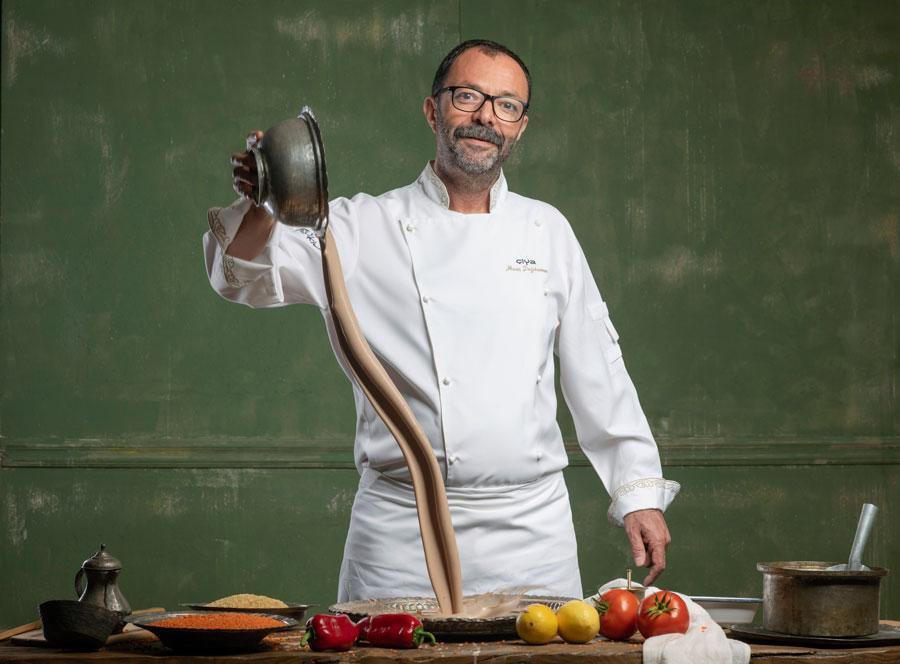
The Netflix documentary “Chef’s Table,” which tells the stories of world-famous chefs, last week featured the life of a Turkish chef for the first time. Musa Dağdeviren, the owner of the Çiya Kebap and Çiya Sofrası restaurants in Istanbul’s Kadıköy neighborhood and the founder of the magazine “Yemek ve Kültür” (Food and Culture), aims to protect generations-old local recipes.
Born in 1960 in Turkey’s southeastern province and gastronomic paradise of Gaziantep’s Nizip district, Dağdeviren is the youngest of six siblings. He remembers a childhood where he spent most of his time at home with his mother in the kitchen. He was interested not only in food, but anything old, to revive dying values and tastes in the face of changes.
“This is still the same for me. I buy albums of people I never knew. I collect everything, pots, pans, forks and spoons. But all of them should have one thing in common: They should all belong to this geography,” he says.
He is in pursuit to record all foods of this geography.
“I went to school for three weeks only in 1976. I lost my father in a traffic accident at 12. I had to leave school to earn money. After losing my father, one of my brothers was handed over a bookstore, which I went to frequently. Most of the books were left-wing ones and classics. I read about many things, including social sciences, philosophy, and history. I realized in these books that what belongs to the memory of our geography and city have gone. We can find them only in antique sellers, bibliopoles and flea markets. But it is possible to keep them surviving, which is the goal of my life.”
He says he learned earth from his father’s side and fire from his mother’s side. His father was a farmer and uncles were bakers, whose bakeries he grew up in. The bakeries at the time were not like modern-day ones, according to him. Those bakeries served as places that carried the collective memories of the city.
While rushing from the bookstore to the bakery every day, Dağdeviren’s life changed direction. He was aged 17-18 when he started working at a different bakery. But Dağdeviren grew increasingly uneasy at the working conditions of the workers there. The workers were not insured, and he could not turn a blind eye to their plight. He formed a committee with two bakers and began meeting them in local coffeehouses. Having mobilized a few bakers, he called a strike, leading to the closure of all bakeries across the city. His uncle’s bakery was one of them.
But his political awakening forced him to leave his hometown of Nizip after receiving threats and their workplace being shot.
He came to Istanbul, like many who fled for better opportunities, where his uncles ran restaurants. He worked with them and at the same time visited community centers. He watched theater plays, went to concerts and attended cultural events. He had friends who were university students, with whom he organized reading days. One day, they decided to travel the world together. Their travels lasted for 27 months, visiting the Soviet Union, China, Iraq, Syria and the Balkans. Their route resembled the Silk Road.
Not only a chef, an anthropologist, too
After his two-year travels, he was conscripted into the army to do his mandatory service. Even there, he worked in the kitchen.
“When I was there, they cooked everything separately and mixed them all in the end. Even meat and onion were not cooked together. That is why the foods were not tasty and almost nobody ate them. I changed the recipes; then the meals were not enough.”
When he finished his compulsory military service, he decided to open a restaurant with his childhood friends. He opened Çiya. But things did not go as planned. Dağdeviren was arrested in the 1980 military coup, the brutal aftermath of a series of fatal clashes between radical left and right groups in the 1970s, for attending protests.
After being released, his friends no longer wanted to be associated with him, leaving him with hefty debts. His life took a turn, however, when he met his wife Zeynep. “I worked in the kitchen, she handled the finances. She is still the real boss,” he says.
In the Netflix episode on Dağdeviren, cooking historian Özge Samancı describes him as “not only a chef, but a food anthropologist.” “His restaurant Çiya is a food museum,” she says.
“When you visit his restaurant, it is like you visit all cities and villages in Turkey at the same time,” Vogue’s food editor Cemre Narin says.
Çiya has become a cornerstone in Turkish gastronomy. At a time when kebabs and lahmacun, a pizza-like dish with spicy minced meat topping, were underappreciated, he served traditional Turkish tastes with Bach, Chopin and Vivaldi playing in the background in his restaurant.
“The goal was to eliminate this division and we did it. This is how our customer profile was created. We had customers from all walks of life. In 1995, we bought the shop next to us. I wanted to gather my works on food culture in a book and had an idea to make a food atlas. My wife told me to try them in the restaurant and I started using these recipes. This is how Çiya Sofrası was born,” he said.
Dağdeviren says he was surprised when he got the offer from Netflix. “I knew about Netflix but I never watched it. I saw that they featured the chefs that I loved and joined conferences together with in the past. Then I accepted it. I produced a project on Turkey’s food and beverage culture. I am proud that people outside this country have acknowledged it,” Dağdeviren says.
Now his biggest dream is to open a cuisine institute, which is why he is making a collection of everything from Turkey.